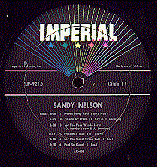 Imperial Album Discography
Imperial Album DiscographyThe Imperial Label was started by Lew Chudd in 1946 in Los Angeles, California. Originally, the label
concentrated on local Mexican groups and ethnic folk artists and the series of 10-inch LPs reflect this. In
August, 1947, Lew Chudd started a popular record series consisting of rhythm and blues recordings.
Two years later, he began tapping into the rhythm and blues artists in New Orleans, which had been
largely ignored by the major record companies. His most significant discovery was Fats Domino, a 22
year old piano player who sang with a Creole accent. In 1949 he recorded a song called "The Fat Man"
which became an R&B hit in early 1950.
Fats Domino was the most important artist on Imperial and had a impressive string of hits from 1950 until
1963, when he left the label in favor of ABC-Paramount. The early Fats Domino records sold in the
"Race Record" market, but with "Ain't It a Shame" in 1955, he crossed over into the mainstream popular
music market, adding to his stature as one of the "founding fathers" of rock and roll.
In addition to Fats, Chudd recorded T-Bone Walker, Smiley Lewis, Lil' Son Jackson and the Spiders. On
most of the recordings made in New Orleans, the Dave Bartholomew band was used as accompaniment.
Bartholomew served as the Artists & Repertoire (A&R) man for Chudd, and was the arranger for many of
the sessions. Bartholomew's band was popular in the clubs of New Orleans at the time, and in addition to
having two albums under his own name on the label, he recorded the original version of "My Ding-A-Ling"
as a single in 1952 (Chuck Berry took essentially the same song to #1 twenty years later).
In 1957, the young Ricky Nelson, son of Ozzie and Harriet Nelson of the popular TV show The
Adventures of Ozzie and Harriet, recorded three songs for the Verve label, essentially on a lark. His
cover version of Fats Domino's "I'm Walkin'" was featured on the Nelsons' TV show and sold like hot
cakes. Incredibly, Verve did not have Ricky Nelson under contract, and Lew Chudd quickly signed him
to Imperial. Nelson became a "Teenage Idol" and a very consistent hit-maker for the label. Rick Nelson's
singing is sometimes disparaged, but he did have a real feel and respect for rockabilly, and produced
some fine examples of that genre. Many of the best songs Nelson recorded were written by Johnny and
Dorsey Burnette. The Ricky Nelson album LP-9061, Ricky Sings Again, is a particularly good
example of this. Nelson left the label in 1963 for Decca.
In 1958, Imperial was one of the first labels to issue stereo albums. They used a disctinctive black stereo
label for these issues intil 1964, when the label was sold. One of the decisions made in 1958, when the
stereo albums were first issued, was to give them an entirely different numbering system not related to
their mono counterparts, one of the only labels to take such a bewildering course. After a few years of
confusion, Imperial changed the stereo numbering system (LP-12000 series) to echo the corresponding
last three digits in the LP-9000 mono numbering system. We have provided a mono-stereo record
number crosswalk as an aid to getting through this mess.
In 1961, Lew Chudd bought the Aladdin Records catalog and reissued many of the Aladdin masters on
Imperial (See Aladdin/Score Discography). The Imperial releases of Aladdin material have an "A"
following the album number. In 1963, Chudd purchased the Minit Label of New Orleans from Joe
Banashak. Imperial was the distributor of Minit from 1961, and with the acquisition of Minit, Imperial
obtained the contracts of Irma Thomas and Ernie K-Doe. The discographies of Joe Banashak's Minit
and Instant labels are included elsewhere under the Discography Main Page.
In 1964, Chudd sold Imperial to Liberty Records, and the label underwent an almost overnight
metamorphosis. Gone were the label's former stars like Fats Domino and Rick Nelson, who had signed
with other labels. The new owners also put somewhat of a damper on the label's artists who weren't
selling much, and concentrated on getting a completely new stable of hip, teen-oriented talent. They
brought Irma Thomas' incredible voice over from the Minit label. They signed several British Invasion
groups, such as the Hollies, Billy J. Kramer with the Dakotas, and the Swinging Blue Jeans. In addition,
new American stars-in-the-making such as Cher, Jackie DeShannon, and Johnny Rivers were signed.
They tapped into the Los Angeles "Go-Go" scene with "live" albums that added excitement to the label. At
least at the beginning, the "live" Johnny Rivers albums (as well as the "live" Sandy Nelson album)
featured studio recordings with label employees overdubbed as the live audience, but they were exciting
nonetheless. The mid-1960s period, from 1964 to about 1968, was the most successful for Imperial on
the record charts.
In 1968, Transamerica Corporation, who owned United Artists, bought the Liberty/Imperial Labels and
merged them with UA. Having had the mid-1960s talent more-or-less run it's course, the new company
needed to recharge the label with the kind of aggressive talent search that was done in 1964.
Unfortunately, the artists signed after 1967 were comparatively weak chart performers (with a few
exceptions like the Classics IV, who were signed before 1968), and the label languished. In 1970, UA
transferred most of the Imperial artists to Liberty for future releases, and by 1971 Imperial had essentially
ceased to exist as a distinct new-product label. UA did, however, maintain the back-catalog of Imperial
albums for many years afterwards, and they did reissue some Imperial and Aladdin material under the
United Artists banner. Today, the UA, Imperial, Minit, Liberty, Aladdin and Score masters are all owned
by the huge EMI-Capitol Music empire, which purchased United Artists from TransAmerica in the 1980s.
Although rhythm and blues was the mainstay of the pre-1964 Imperial label, Lew Chudd's label also
recorded jazz, with top artists like Sonny Criss and Warner Marsh, and country music (Slim Whitman
being his most successful artist). Chudd's label had a broad scope and included recordings of movie
soundtracks, big band music, folk artists, gospel, and march music. The Liberty-owned Imperial label, on
the other hand, was much less eclectic, and much more top-40 oriented. As is many times the case, the
sale of a successful label, as Imperial/Liberty was sold in 1968, leads to the decline of the label's success,
and eventually, it's demise. This certainly was the case with Imperial.
Lew Chudd, the founder of Imperial Records, died on June 15, 1998, just shy of his 87th birthday.
The sources for this discography were Schwann Catalogs from 1953 to 1970, Phonolog Reports from
1963, UA catalogs from 1973, and of course the records themselves. Michael Ruppli's Imperial
Discography was the source of the titles of unissued records. The date of Lew Chudd's death was
reported to us by his son, Reeve.
We would appreciate any additions or corrections to this discography. Just send them to us via e-mail. Both Sides Now Publications
is an information web page, and we have no association with Imperial Records. Imperial Records is
currently owned by EMI-Capitol Music. Should you be interested in acquiring albums listed in this
discography (which are all out of print), we suggest you see our "Frequently Asked Questions" page and follow the
instructions found there.
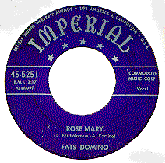 Go on to Imperial, Part 1 (1950-1955) Early 10-inch LPs
Go on to Imperial, Part 1 (1950-1955) Early 10-inch LPs
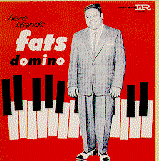 Go on to Imperial, Part 2 (1956-1958) LPs 9001-9050
Go on to Imperial, Part 2 (1956-1958) LPs 9001-9050
 Go on to Imperial, Part 3 (1958-1961) LPs 9051-9150
Go on to Imperial, Part 3 (1958-1961) LPs 9051-9150
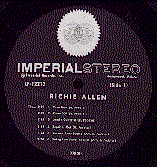 Go on to Imperial, Part 4 (1961-1963) LPs 9151-9250
Go on to Imperial, Part 4 (1961-1963) LPs 9151-9250
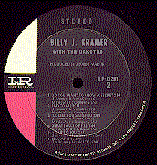 Go on to Imperial, Part 5 (1963-1967) LPs 9251-9350
Go on to Imperial, Part 5 (1963-1967) LPs 9251-9350
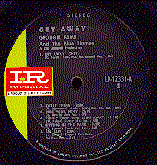 Go on to Imperial, Part 6 (1967-1970) LPs 9351/12351-end
Go on to Imperial, Part 6 (1967-1970) LPs 9351/12351-end
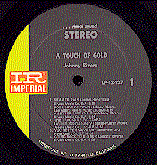 Go on to Imperial, Part 7 LP-94000 series and Related LPs
Go on to Imperial, Part 7 LP-94000 series and Related LPs
 Go on to Imperial, Part 8 Stereo/Mono Cross-Reference
Go on to Imperial, Part 8 Stereo/Mono Cross-Reference
 Back to the Discography Listings Page
Back to the Discography Listings Page  Back to the Both Sides Now Home Page
Back to the Both Sides Now Home Page